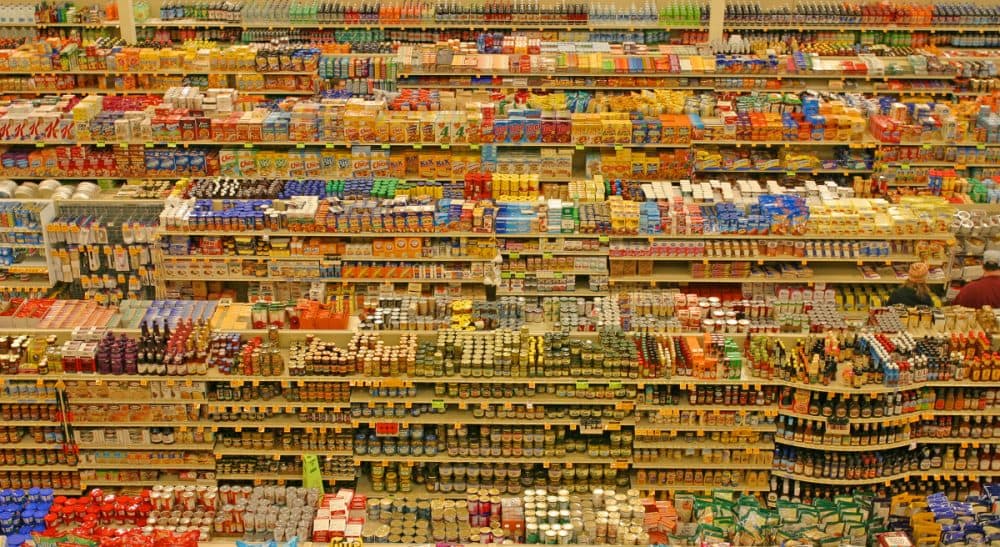Advertisement
Moral Indigestion In The Global Pantry

Not long ago, most of us were locavores. We ate what we could locally grow, fish, hunt, gather and raise. In New England, so recently blanketed with near-record snowfall, such pickings were limited during the winter. The colonial cupboard in February was a stark contrast to the offerings of Whole Foods, Shaw’s or the Peapod truck. You reaped, as the saying goes, what you sowed. That meant that you neither reaped nor sowed oranges, edamame, pomegranates or bok choy — all of which, in spite of the snow, you could likely get at your local market.
The lush bounty most Americans take for granted is one of the greatest marvels of the modern era. But it is not enough to enjoy the sweetness of our global menu. We must also savor the moral bitterness: Our meals are seasoned with the paradoxes of globalization.
Explore your kitchen. I recently scrutinized the contents of my own pantries and refrigerator, much to the bemusement of family, and discovered a world of cuisine not imagined by our forebears. I examined each can, jar, package and carton. My gastronomic itinerary included India (black pepper), Italy (balsamic vinegar), Peru (anchovies), China (frozen spinach), France (biscuits), Greece (olives), Israel (couscous), England (curry paste), Mexico (beef bouillon), Madagascar (vanilla), Canada (pizza dough), Spain (olive oil), Morocco (clementines), Belgium (chocolate), Australia (dried apricots), Ecuador (mango), Honduras (banana), Chili (pears) and Brazil (papaya). In the mornings, I sip coffee from Costa Rica, Sumatra and Ethiopia. If a guest prefers tea after dinner, we can brew leaves from Sri Lanka, Turkey or Kenya.
Of course, these are only the most obvious sources of my larder, what I could read on labels. The origin of many, if not most, of the ingredients in processed foods are far less apparent. Americans are astonishingly naïve about our diet. We know more about the wardrobes at the Oscars than we do about the sources of our next meal. I regularly shop at Trader Joe’s, a chain notoriously clandestine about its suppliers. But much of the store’s inventory, by necessity of geography and climate, derives from overseas.
Many products — margarine, instant noodles, cookies, popcorn, bread, cereal, peanut butter, Nutella, lipstick, toothpaste, shampoo and soap — contain palm oil. Not a drop of it comes from the U.S., but from deforested lowlands in the tropics, such as in Malaysia, Nigeria and Cameroon. There is a wide-ranging sustainability effort in regard to palm oil, but not in West Papua, where local landowners, who have tilled the soil for 20,000 years, now dwell under Indonesian military rule and are often coerced into selling their plots for as little as 65 cents a hectare.
Our culinary delights are often the environmental nightmares of small, isolated communities at the far fringes of the world system.
Knowing this makes your next pint of ice cream a little less yummy. Our culinary delights are often the environmental nightmares of small, isolated communities at the far fringes of the world system.
Starbucks’s Komodo Dragon Blend — I have a bag right here in my office — retails for about $14 a pound. According to my anthropology colleague Paige West, author of "Imagined Primitive: The Social World of Coffee from Papua New Guinea," local growers earn only 15 cents an hour for cultivating these beans — and they don’t even drink coffee!
A similar woeful tale can be told about a host of staples in our national pantry, many of which arrive on the table via dubious labor practices, over-fishing, soil degradation, excess use of pesticides, graft, deception, low wages that would never be tolerated by most Americans, outright violence, and, as we learned from recent revelations about Thai shrimp and West African cocoa, enslavement. Our national menu may be gloriously international, but it comes with a heaping side portion of ignorance. Without it, the body politic would rightly come down with a terrible case of moral indigestion.
Advertisement
Food is not only good to eat, we anthropologists say, it is also good to think. And in your kitchen tonight, as you prepare dinner, think about the myriad international connections that make our sumptuous kitchens possible. If we are what we eat, then we are nothing if not globalvores who chew, for better and for worse, on the rest of the world.

